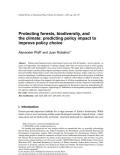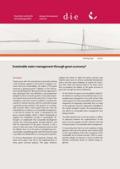This report evaluates the requirements for an assessment of climate change impacts on agriculture to guide policy makers on investment priorities and phasing. Because agriculture is vital for national food security and is a strong contributor to Brazil's GDP growth, there is growing concern that Brazilian agriculture is increasingly vulnerable to climate variability and change. To meet national development, food security, climate adaptation and mitigation, and trade goals over the next several decades, Brazil will need to significantly increase per area productivity of food and pasture systems while simultaneously reducing deforestation, rehabilitating millions of hectares of degraded land, and adapting to climate change. There is inadequate data to accurately model projected climate challenges facing Brazil. The report concludes that key integrated and linked interventions are needed in the short term to significantly improve currently available assessments of climate change impact on Brazilian agriculture and to guide policy makers with the priorities and phasing of needed investments.
This paper outlines a conceptual and policy approach to bringing social concerns to the forefront of green economy and sustainable development debates. It examines a wide range of social problems and other issues associated with green economy, reasserting that any development transformation must be both green and fair; leading to a green society not just a green economy. However, different transition pathways exist, each with different developmental implications. This paper addresses the key role of social policy, agency and participation in crafting transition paths that are green and fair. A comprehensive or transformative social policy is argued to play a key role in mitigating unfair consequences, influencing behaviour and transforming patterns of inequality. This paper concludes by highlighting issues of fragmentation associated with knowledge, institutional arrangements and socil agency, and suggests the need for 'joined-up analysis, policy and action'.
This summary was prepared by Eldis.
In 1992, governments gathered for the United Nations Conference on Environment and Development in Rio de Janeiro. The “Rio Declaration” laid out several principles of sustainable development, including the central role of policy instruments. This article takes stock of where we stand today in implementing sound and effective environmental policy instruments throughout the world, particularly in developing and transitional economies. It agures that, as our experience with market-based environmental policies has deepened over the past two decades, so has the ability to adapt instruments to complicated and heterogeneous contexts—but we are only just beginning, and the need to be further along is dire. One key factor may be that economists have not yet meaningfully accounted for the importance of political feasibility, which often hinges on risks to competitiveness and employment, or on the distribution of costs rather than on considerations of pure efficiency alone.

Policies must balance forest conservation’s local costs with its benefits—local to global—in terms of biodiversity, the mitigation of climate change, and other eco-services such as water quality. The trade-offs with development vary across forest locations. This article argues that considering location in three ways helps to predict policy impact and improve policy choice: (i) policy impacts vary by location because baseline deforestation varies with characteristics (market distances, slopes, soils, etc.) of locations in a landscape; (ii) different mixes of political-economic pressures drive the location of different policies; and (iii) policies can trigger ‘second-order’ or ‘spillover’ effects likely to differ by location. This article provides empirical evidence that suggests the importance of all three considerations, by reviewing high-quality evaluations of the impact of conservation and development on forest. Impacts of well-enforced conservation rise with private clearing pressure, supporting (i). Protection types (e.g. federal/state) differ in locations and thus in impacts, supporting (ii).

